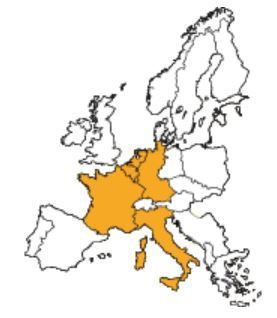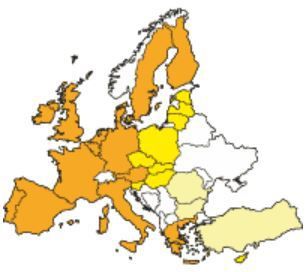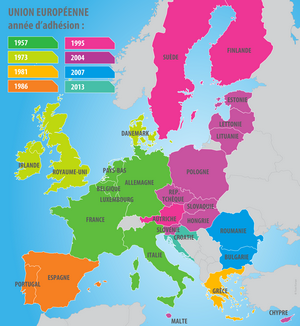EU, progressive construction ...
/image%2F1045670%2F20150330%2Fob_b827bf_ue-28.png)
Traditionally, generation after generation, European countries used to be in war, citizens always knew conflict :
- Territorial conquest,
- Defenses of the French monarchy by the European monarchies during the French Revolution and defense of the Republic against European monarchies,
- the Napoleonic wars,
- War of 1870,
- 1st World War,
- 2nd World War...
6 years after the 2nd World War, six countries decided to fight against this scourge, the enemy brothers do not want to go to war anymore. And de facto it is the case up to now.
1951 : Germany, Italy, France, Benelux (Belgium B - Netherlands NL - Luxembourg)
1951 : Creation of the ECSC, the European Coal and Steel Community which provides for the joint management of coal and steel supply (the lowest prices, free circulation without customs duties, equal and guaranteed supplies for all, improved working conditions) to ensure :
- Peace,
- an economic developpement,
- a reducing unemployment,
- and improving the standard of living in the area.
1951 : EDC, European Defence Community.
1954 : Denial of the ratification of the EDC by the French Parliament.
1957 : Creation of the EEC, European Economic Community. Its tasks, by establishing a common market and progressive closer becoming economic policies of the Member States, are to :
- promote peace,
- promote democracy in Europe,
- promote solidarity between European peoples and regions,
- promote harmonious development of economic activities throughout the Community,
- ensure continuous and balanced expansion, increased stability, a higher standard of living,
- ensure closer relations between the States belonging to it
1962 : Beginning of the CAP (Common Agricultural Policy) to ensure food self-sufficiency in the EEC.
1968 : Removal of tariffs.
1972 : Beginning of ERM (Exchange Rate Mechanism), the forerunner of the Euro, which created the European Monetary Cooperation Fund (EMCF) to limit the volatility of the EEC currencies (+/- 2.25% between the currencies of theEEC and +/- 4.5% between EEC currencies and the dollar).
1973 : 1st enlargement - EEC 9 (EEC 6+ UK, Ireland, Denmark)
1974 : Biginning of the ERDF (European Regional Development Fund).
1979 : First direct universal suffrage election to the European Parliament. First President of the European Parliament was Simone Veil - Speech after election - Official inauguration speech : autonomy, unemployment and labor law, solidarity, monetary and energy independence, international cooperation ... Parliament's role : political and budgetary control ... cooperation between Commission, Council and Parliament for the legislative building ... European Institutions blocked against which Parliament has to fight ...
1981 : 2nd enlargement - EEC 10 (EEC 9 + Greece, a new European Democracy)
1986 : 3rd enlargement - EEC 12 (EEC 10 + Spain and Portugal, two new European democracies)
1987 : Erasmus program to aid student mobility to other European universities.
1989: Democracy in Poland, Hungary and fall of the Berlin wall (see the article on the Blog)
1990: Reunification of Germany.
1992 : Maastricht Treaty creating the European Union : single currency, foreign policy and security, and strengthening cooperation on justice and home affairs.
1993 : the single market : free movement of goods, services, people and capital
1995 : 4th enlargement - EU 15 (EU 12 + Austria, Finland and Sweden)
1995 : Schengen Treaty. Travelers can visit the first 7 countries without any border identity check : Germany, Belgium, Spain, France, Luxembourg, the Netherlands and Portugal.
1999 : Euro in all international transactions with a fixed rate in the first 11 countries : Austria, Belgium, Spain, Finland, France, Greece, Ireland, Italy, Luxembourg, the Netherlands and Portugal.
2001 : Euro entered citizens'wallets.
2004 : 5th enlargement - EU 25 (EU 15 + 10 countries of the former Eastern bloc under the tutelage of the former USSR (from north to south : Estonia, Latvia, Lithuania, Poland, Czech Republic, Slovakia, Hungary, Slovenia), Malta and Cyprus.
2005 : Refusal of the European Constitutional Treaty by France and the Netherlands, in a referendum.
2005 : FRONTEX Agency (surveillance of external borders agency)
2007 : 6th enlargement - EU 27 (EU 25 + Bulgaria and Romania, two countries of the former Eastern bloc under the tutelage of the former Soviet Union disappeared in 1991)
2009 : Lisbon Treaty adopted in 2007 by the Council, the European Parliament and the national parliaments of the 27 member states :
- First President of the European Council, Herman Van Rampuy (Belgian), appointed by the European Council (Heads of State).
- First European Commission accepted by Parliament.
2008 up to now : Financial crises which imposed financial institutional reforms : the European Banking Authority ; the European Stability Mechanism ; a treaty on stability, coordination and governance in the Economic and Monetary Union ; Unique Monitoring Mechanism ; Banking Union ...
2012 : the ECI (European Citizens' Initiative)
2012 : Nobel Peace Prize is given to the EU
2013 : 7th enlargement - EU 28 (EU 27 + Croatia).
The European Union reached its current size. But other negotiations are either stopped or underway or possible for integration : Iceland, Serbia, Bosnia & Herzegovina, Montenegro, Macedonia, Albania and Turkey (see article on stopped negotiations with Iceland).
2014 : Election of the President of the European Commission, the EU executive, the European Parliament (after the proposal of the European Council, the Heads of States). This procedure takes place for the first time under the Treaty of Lisbon.
2014 : President of the European Council, Mr Tusk Donard (Polish). The European Council is responsible for providing the overall direction, therefore the Commission to the EU



/image%2F1045670%2F20150330%2Fob_15d02f_cee-10.JPG)
/image%2F1045670%2F20150330%2Fob_18e8a8_cee-12.JPG)



